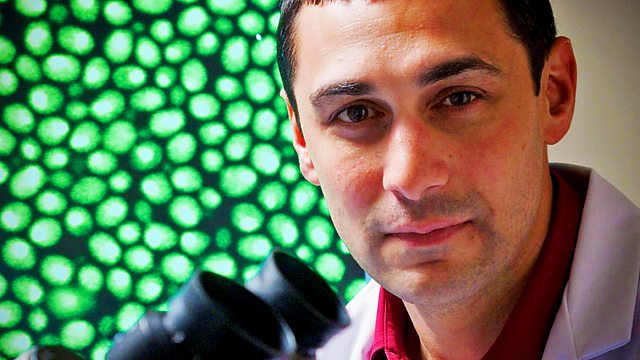Human Cultural Evolution Versus Genetic Evolution
Adam Rutherford asks what the effect of globalisation and a greater choice of partners is on human genetic evolution.
Human uniqueness takes many forms: we can communicate complex ideas; we have developed technologies, such as medicine and transport; and we change our environment to suit our biology. But how does human culture affect our biology - our genes?
Geneticist and broadcaster Adam Rutherford continues to explore the evolutionary fate of the human race...
Following on from Programme 1 where, Adam discovered that humans are still evolving, but perhaps not as much as we have done in the past. And he learnt that our culture (medicine, technology etc.) certainly does interact with our biology. This week, he explores more how genes and culture interact and asks whether the choice of who we have children with is changing and whether this has an effect? He finds out if the increase in global travel is opening up more options for us to find partners and tries to pin down an answer to the often asked question - are we getting brainier?
Many people think that evolution is always progressive and always for the best. But Steve Jones says that this is a common misconception, where Darwinian evolution gets muddled up with Lamarckism. French biologist, Jean Baptiste de Lamarck saw a pattern in evolution - which he called, 'the Law of Necessary Progress' - that it was built in that things were bound to get better. But evolution by natural selection is not like this - it's just a mechanism that just cranks around... So a future, where we evolve large thumbs for better texting and playing video games and even become more intelligent, isn't all that likely.
A major reason why humans are changing genetically nowadays, is due to the impact of travel and globalisation. Professor Steve Stearns is excited by the prospect of grandchildren from his youngest son who has married a Tanzanian lady - if they have children, "there will be genes meeting, that haven't seen each other for more than a hundred thousand years." This genetic refreshment caused by out-breeding could spell a genetically healthy human future.
Professor Spencer Wells, National Geographic Explorer-in-Residence and Director of The Genographic Project, is attempting to trace human migrations throughout history - tracking down where individuals have come from - and he is already seeing massive genetic diversity in cities all over the world.
Professor Steve Jones thinks that this is where evolution has actually speeded up and is really active. But he thinks it's speeding up towards a grand averaging out, where, over hundreds of generations of this great mixing, individuals will end up, genetically very fit, but as a species, very homogenous. And we won't know what the consequences of this might be.
Adam attempts to untangle another evolutionary pressure - that of sexual selection. Who we choose as a mate, also has an effect on our evolutionary trajectory. Kevin Laland from St Andrews University thinks that our cultural preferences can be stronger than genetic preferences, which means that sexual selection could become a more important driving force for human evolution in the future.
As to whether we're evolving greater intelligence? No chance says Steven Pinker!
Producer: Fiona Roberts.
Last on
More episodes
Next
You are at the last episode
Broadcasts
- Tue 23 Aug 2011 11:00Βι¶ΉΤΌΕΔ Radio 4
- Thu 25 Aug 2011 21:00Βι¶ΉΤΌΕΔ Radio 4

